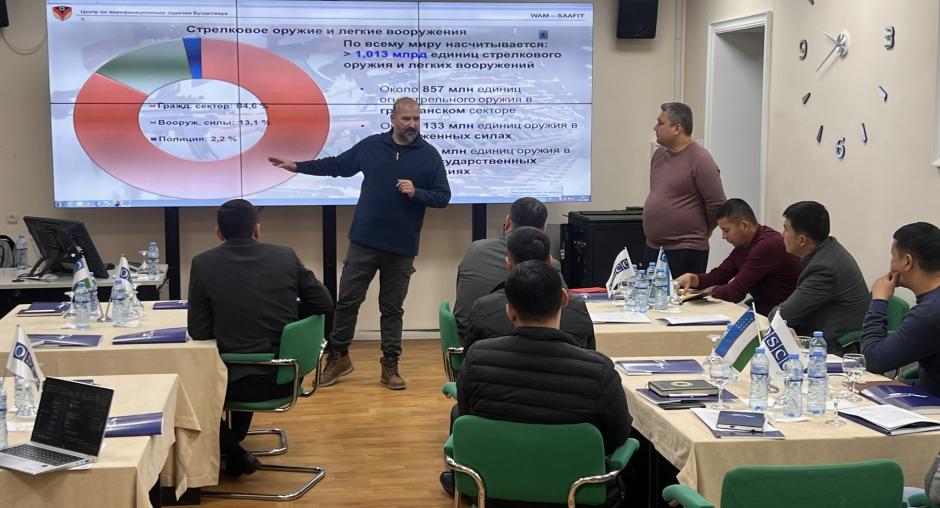OSCE helps Uzbek customs officials combat illicit trafficking of weapons, ammunition and explosives

From 12 to 15 November, the second module of the OSCE training course on “Combatting Illicit Trafficking of Small Arms and Light Weapons (SALW), Ammunition and Explosives for Border and Customs Services” took place at the Advanced Training Faculty under the Customs Committee of Uzbekistan in Tashkent.
The training provided 18 customs officials from the operational branches and headquarters and the border checkpoints of the Customs Committee of Uzbekistan with an in-depth understanding of their roles in identifying sources and proliferation of illicit SALW as well as in combating illicit trafficking of SALW, ammunition and explosives in the field. The officers also gained insights into international legal frameworks, national regulations and effective post-seizure procedures, and enhanced their risk management expertise.
“The accumulation and uncontrolled spread of SALW, ammunition and explosives in the neighboring country presents an increased risk of their illicit trafficking to Central Asia. This training contributes to Uzbekistan’s efforts to prevent illicit cross-border movement of goods including SALW, ammunition and explosives,” said Mirazam Khamraev, Director of the Customs Training Institute under the Customs Committee of Uzbekistan.
“Border guards and customs officers are the first ones to screen persons and goods entering a country. This training course was designed to familiarize the participants with the risks related to arms transfers from Afghanistan through practical exercises. It also aimed to improve their knowledge in the identification and documentation of SALW and conventional ammunition and their markings in illicit trafficking,” shared Albina Yakubova, Project Officer of Border Security and Management Unit of the OSCE’s Transnational Threats Department (TNTD).
“I hope this training achieved its long-term objectives aimed at increasing the capacities of the first and second line customs officers to prevent and respond to transnational threats related to the trafficking of SALW, ammunition and explosives and strengthening the co-operation in this area”, concluded Antti Karttunen, Head of OSCE Project Co-ordinator in Uzbekistan.
The course was organized by TNTD and the OSCE Conflict Prevention Centre in collaboration with experts from the Small Arms Survey, INTERPOL and the German Bundeswehr Verification Centre. It was conducted as part of the extrabudgetary project “Strengthening the Resilience of Uzbekistan to Address Cross-border Challenges Emanating from Afghanistan”, funded by Sweden, the Federal Republic of Germany and the United States of America.
